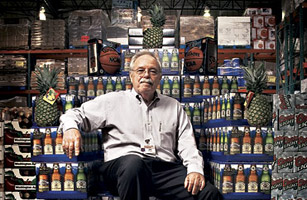
In an era of CEO pay gone wild, Jim Sinegal is the steal of the century. The co-founder and chief executive of Costco earns a salary of just $350,000 (plus modest bonus and stock options), richly refuting the boardroom notion that CEOs of billion-dollar corporations require pay packets to match. Costco is one of the U.S.'s largest companies, with 118,800 workers, 473 warehouse-club stores and sales of $51.9 billion in its most recent fiscal year. Costco's stock has trounced archrival Wal-Mart's in recent years. Perhaps most unusual, Sinegal has resisted Wall Street pressure to become a less generous employer; store workers earn an average of $17 an hour and pay just 9% of the cost of health insurance, a rich package in the penny-pinching retail industry. "Our attitude is that if you hire good people and pay them a fair wage, then good things will happen for the company," says Sinegal, who remains hale at 70.
Costco's success proves that low prices for consumers don't have to come at the expense of wages and benefits for workers. Sinegal does it by saving money elsewhere in the business and being shrewd about merchandising. A Costco store carries less variety than a competing Sam's Club, keeping inventory costs down. But Sinegal also entices shoppers to spend more than they might anticipate by devising irresistible deals on luxury items like Movado watches and Dom Perignon champagne (and by offering prompt refunds on two that proved too irresistible: Picasso drawings whose authenticity was questioned). A bargain-price boss, discount goods for consumers and workers who can afford the company health plan? What a novel business idea.